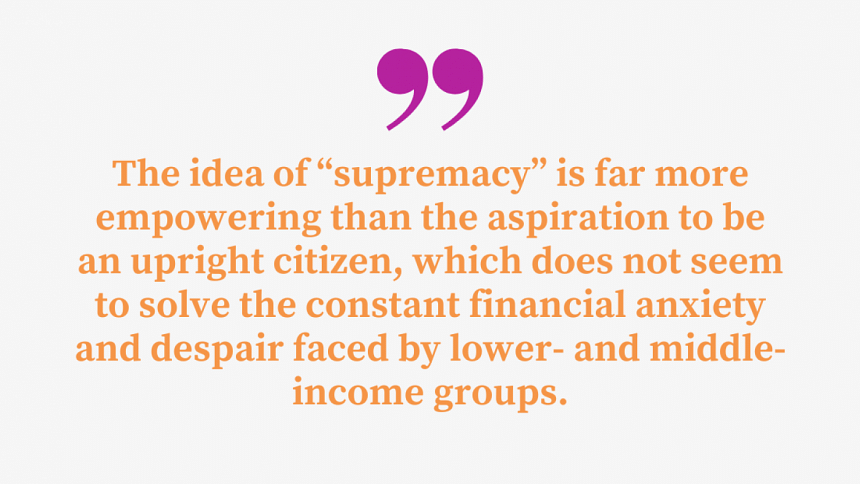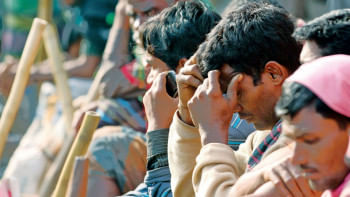Youth Violence: The definition of ‘boro bhai’ needs to change

Almost every day on my way to work, traffic comes to a standstill as we approach Farmgate. The ongoing construction of Dhaka metro rail has significantly narrowed this main artery, although this does not stop the buses, cars, motorbikes, and pedestrians from rushing forward all at once, leading to further choking and more misery. But while people sweat it out in the heat, dust and smog, there are some youngsters who find "opportunities" in the relentless gridlock. With speed and precision, their slight bodies glide through the traffic, their eyes glazed and predatory as they look for the unmindful passenger talking on their mobile phone which they can snatch in an instant before disappearing into the crowd. Sometimes you can see them huddled under the foot overbridge, their faces deep inside dirty polythene bags, inhaling something called "dandy" or glue. The glue helps them forget their isolation, their anger, and most of all, their hunger.
Bangladesh has been cited by a global survey as the seventh angriest, saddest, and most stressed nation in the world. The report gives five significant contributors of global unhappiness: poverty, bad communities, loneliness, scarcity of good work, and hunger.
I would add to this list a sense of powerlessness and frustration in a society that is grossly unequal in terms of wealth and opportunity, and devoid of role models and mentors. This could explain the regular incidents of young men and teenagers getting involved in crime, sometimes as heinous as murder.
On June 25, Jitu, a student of Class 10, beat a teacher to death with a cricket stump. He was angry because the teacher had reprimanded him for inappropriate behaviour on various occasions and decided to beat him up in front of everyone; he said he wanted to impress his girlfriend. It was a way for Jitu to establish his position, his power, regardless of the consequences.

Hasibul Bashar, a 25-year-old Chhatra League leader, was hacked to death on July 7, his throat slit by a group of assailants. Two of the main accused are aged 25 and 20. The gruesome murder was the culmination of a feud between Chhatra League and Jubo League members over who had supremacy in the locality. Being able to establish domination over an area is the prime catalyst that leads to such violent encounters. And unsurprisingly, when the "big brothers" (boro bhai) of a neighbourhood – young men who are members of a political party – engage in criminal behaviour that includes brutal and public killings of rivals, the "younger brothers" (chhoto bhai) will follow suit. It is a culture of toxic masculinity that glorifies violence and domination of others while scorning empathy. Thus, the rise of teenage gangs in major cities, the members of which become copycats of their "mastaan heroes" who are invincible and untouchable by even the law of the land.
In 2020, teen gangs committing serious crimes such as rape, murder, and mugging made the headlines numerous times. A report in The Daily Star revealed that there were as many as 40 teen gangs in Dhaka, and around a hundred in Chittagong. All these gangs have the "blessings" of "big brothers" and were engaged in drug peddling and drug abuse. Many carry firearms and weapons as a show of their strength, which manifest during "turf wars" with rival gangs.
The idea of "supremacy" is far more empowering than the aspiration to be an upright citizen, which does not seem to solve the constant financial anxiety and despair faced by lower- and middle-income groups. Psychologists have cited poor parental skills, narcotics, and deteriorating mental health – especially during the Covid pandemic – as adding to the stress of young people. During the pandemic, the only recreational activity for young people was to be engaged in social media. In an interview with The Daily Star, Kamal Uddin Chowdhury, a professor of clinical psychology at Dhaka University and a researcher of adolescent mental health, said that this dependence on social media gave our youths "a narrow sense of identity and culture, which they reproduce by forming groups in their real lives."
Most of these teenagers, moreover, are from low-income groups with parents struggling to make ends meet. While making TikTok videos and watching films that glamourise violence and law-breaking provide some reprieve, in the real world they are confronted with the blatant divide between them and the boys/men from privileged sections who zoom through the streets in their flashy cars. Thus, anger, frustration, and resentment are their constant companions that may be acted out through aggression.
Which brings us to the popular development catchphrase "demographic dividend," especially the one Bangladesh is enjoying at present. It is basically a window of opportunity a country gets when its working population is greater than its dependent population (children and the elderly) and has the potential for accelerated economic growth. For Bangladesh, this window will be open till around 2040. But to reap the benefits of this demographic dividend, the country must invest in all those sectors that affect the life of a young person: quality and affordable education, health and nutrition, safety, economic stability, recreational facilities, better skills, and better-paying jobs. At the same time, the state must promote the idea that crime does not pay, and those who commit crime will be held accountable and punished no matter who they are connected to. This demands a total cleansing within political organisations of members who engage in all kinds of crime, yet enjoy total impunity from the law. The definition of "big brother" needs to go back to being a mentor who brings positive influence to the lives of their young disciples and teaches them to be empathetic, fair, and honourable individuals.
Aasha Mehreen Amin is joint editor at The Daily Star.

 For all latest news, follow The Daily Star's Google News channel.
For all latest news, follow The Daily Star's Google News channel. 





Comments